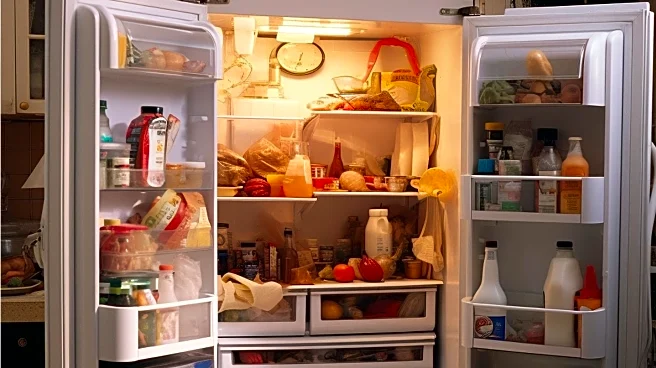What is the story about?
What's Happening?
Recent insights from food scientists highlight the risks associated with overstuffing refrigerators, which can lead to uneven cooling and spoilage of groceries. Bryan Quoc Le, a food scientist, explains that blocked vents restrict airflow, causing internal temperatures to rise and become uneven. This can result in 'hot spots' where food is more likely to spoil. Keith R. Schneider, a professor of food safety, notes that proper airflow is crucial for maintaining safe temperatures. Overstuffing can lead to warmer spots, particularly in door shelves and back corners, where items like eggs, milk, and leftovers are often stored. These areas can become danger zones, with temperatures between 40°F and 140°F, promoting rapid bacterial growth and potential food poisoning.
Why It's Important?
The implications of improper refrigerator use are significant for food safety and household economics. Spoiled food not only poses health risks but also leads to financial waste, especially in an economy where food prices are rising. The risk of bacterial growth in improperly cooled areas can lead to serious health issues, including foodborne illnesses caused by pathogens like Listeria, Salmonella, and E. coli. Understanding and implementing proper refrigerator storage techniques can help households reduce waste, save money, and maintain food safety standards.
What's Next?
Consumers are encouraged to monitor refrigerator temperatures and avoid overstuffing to ensure proper airflow. Experts suggest keeping refrigerators about two-thirds full to optimize cooling efficiency. Additionally, using inexpensive thermometers to identify warm spots can help in rearranging items for better temperature control. Proper organization, such as storing dairy and eggs on middle shelves, can further enhance food safety. These practices can help mitigate risks and improve the longevity of stored food.
Beyond the Headlines
The issue of refrigerator overstuffing also touches on broader themes of consumer habits and food management. It highlights the need for awareness and education on effective food storage practices. As households strive to reduce waste and improve sustainability, understanding the science behind refrigeration can play a crucial role in achieving these goals. This development underscores the importance of integrating scientific knowledge into everyday practices to enhance health and economic outcomes.















